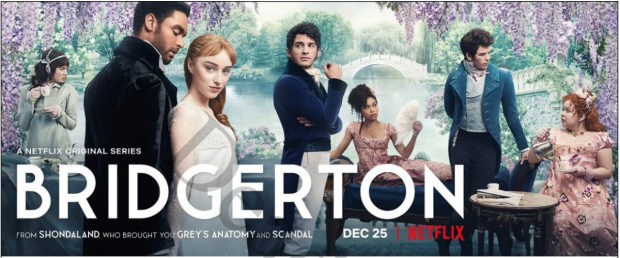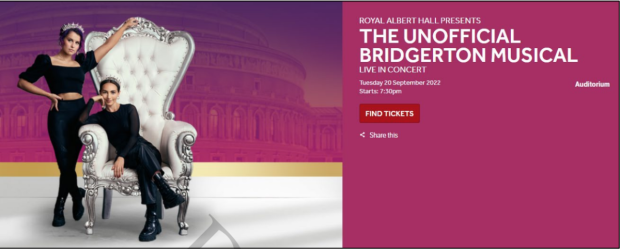Could the unofficial ”Bridgerton” musical creators win the Netflix lawsuit?
It feels, to some extent, a long time coming. The musical’s award-winning success in album form and a 26 July concert performance at the Kennedy Centerin Washington DC were giving the production a lot of momentum, which would surely ruffle a few feathers over at camp Netflix.
Given the streaming giant owns the rights to the material, does that mean it’s going to be curtains for Barlow and Bear? Will the fire in “Burn For You” have to go out? The answer may not be as obvious as it first looks.
Reading the 25-page complaint made by Netflix last weekend revealed a menagerie of grievances. For a relatively lengthy section, Netflix’s lawyers combed through Barlow and Bear’s lyrics, pointing out with almost clinical pernickety-ness every time one of the lines echoed dialogue from the smash-hit Regency-era romantic caper. You can almost imagine some plucky junior at the law firm having to sit there on Spotify while watching Bridgerton episodes on 2x speed. The complaint also cited interviews with Barlow and Bear where the pair noted that the TV show was their main point of inspiration.
The night at the Kennedy Center last month brought about some additional issues. Netflix says: “The live show featured over a dozen songs that copied verbatim dialogue, character traits and expression, and other elements from Bridgerton the series. It included dramatic portrayals of Bridgerton characters by Broadway actors, emoting through the performance of the songs that comprise the ‘musical’.”
Netflix has also said that the pair have ripped off the Bridgerton logo – using a screenshot of the Royal Albert Hall booking page, where the show’s title is presented in block capitals. Notably, everywhere else Barlow and Bear have deliberately used a different font to demarcate the musical from the stage play.


The law on intellectual property is remarkably complex (it’s why entire firms are dedicated to the field) but Netflix doesn’t beat around the bush in expressing frustration with the pair’s endeavours. The streamer’s attorneys explained: “Defendants Abigail Barlow and Emily Bear and their companies (“Barlow and Bear”) have taken valuable intellectual property from the Netflix original series Bridgerton to build an international brand for themselves. Bridgerton reflects the creative work and hard-earned success of hundreds of artists and Netflix employees. Netflix owns the exclusive right to create Bridgerton songs, musicals, or any other derivative works based on Bridgerton. Barlow and Bear cannot take that right-made valuable by others’ hard work-for themselves, without permission. Yet that is exactly what they have done.”
It’s interesting that, despite their initial praise for the musical, both executive producer Shonda Rhimes and the Bridgerton novelist Julia Quinn have submitted testimonials as part of the suit, with Quinn stating: “There is a difference…between composing on TikTok and recording and performing for commercial gain. I would hope that Barlow and Bear, who share my position as independent creative professionals, understand the need to protect other professionals’ intellectual property, including the characters and stories I created in the Bridgerton novels over 20 years ago.”
It’s hard to deny Quinn has a point. If I went out today and decided to stage a Squid Game musical at a venue in London, replicating key, meme-worthy moments from the show (there’d be a song called “Red Light, Green Light” and the choreography would be awesome), I’d probably have an angry letter by the end of the week.
But the key counter-argument is that the Unofficial Bridgerton Musical, which directly states it is not associated with the TV series, is simply a work of fan fiction, rather than an attempt to directly rip off the show. That would mean it is authorised under fair use, regardless of Netflix’s permission. It all started with Barlow simply bashing out some tunes on TikTok. Musicals based on existing IP are manifold. Remember when, for example, A Very Potter Musical was performed – mashing together elements from that Wizarding World. Friendsical, Stranger Sings, Thrones! The Musical and more have all profited from existing fictional universes. .
Key here, however, is that those shows borrowed elements from their source material, whereas the Unofficial Bridgerton Musical is a beat-for-beat imitation of the TV series and books (as Quinn acknowledges in her statement), with characters, plot points and story arcs all drawn from existing work.
In IP law, fan fiction must be “transformative”, in the way A Very Potter Musical is. Transformative work is less likely to pose a market threat to the TV series. Say, therefore, I decided to come up with a musical called Schwidgerton, where the inimitable David Schwimmer travels back in time and found himself looking for love amongst the aristocracy of England, I’d probably be able to get away with it.
Work also cannot be commercial in nature. The latter point means that if the pair had decided to stage the musical in concert for charity, this lawsuit would probably disappear.
Other social media-ites have asked “why now?” (one year on from the album’s digital release) rather than earlier in the musical’s development? It seems that the straw placed on the ill-fated camel was the decision to stage the show live: according to the complaint, that had never been part of the understanding between the parties and, even when the concerts were announced, Netflix didn’t instantly try and shut them down.
What’s more remarkable to read is that the streaming platform is said to have “offered Barlow and Bear a license that would allow them to proceed with their scheduled live performances at the Kennedy Center (which went ahead on 26 July) and Royal Albert Hall, continue distributing their album, and perform their Bridgerton-inspired songs live as part of larger programs going forward.” Why exactly the pair turned this down is unclear.
One other issue is Netflix deciding to stage their own “Bridgerton Experience”, an immersive deep-dive into Quinn’s world. The presence of the musical concert productions, they argue, “threatens their plans” and that the Washington “Bridgerton Experience” immersive production had been harmed by the concert at the Kennedy Center.
Also, Netflix alleges that the stage production has sold merchandise bearing the Bridgerton logo. While most of this merch expressly said “The Unofficial Bridgerton Musical”, which may be more acceptable as it directly echoes the album (which Netflix had permitted), the sticking point was a keychain of a vinyl record, with two words, “Bridgerton Musical” (in block capitals), printed on it. The commission of the “unofficial” part may have crossed a line.
Barlow and Bear have been silent on social media since the lawsuit hit the headlines, and it will be interesting to see how the respondents react. The musical is still set to be performed at the Royal Albert Hall next month, with tickets on sale – and seemingly selling handsomely from the seating plan.
In the meantime, there are a few more questions to be asked – what form of licensing arrangement had Netflix suggested to the duo? Why did they not wish to agree to the offer, despite it likely being the best way to safeguard their material?
Many legal experts say it’s likely this will be settled out of court. There’s also a fun callback to the song “Barbie Girl” from Aqua, which saw the group taken to court by Mattel (who lost, then decided just to use the song for their own promotions). Humble readers, we’ll just have to wait and see.












